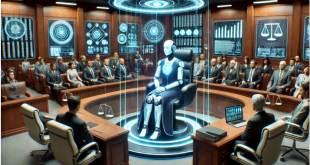Revolutionizing Conflict and Strategy
Artificial Intelligence is marking its presence in nearly every field, and warfare is no exception. From autonomous drones to predictive algorithms, AI is changing the way conflicts are fought and how military strategies are developed. The integration of AI into warfare has the potential to enhance military capabilities, but it also raises profound ethical, strategic, and security concerns. In this blog, we will explore the ways AI is being used in modern warfare and what this means for the future of global conflicts.
1. Autonomous Weapons Systems
The most significant development in AI-driven warfare is the creation of autonomous weapons systems (AWS). These machines can operate without direct human control, based on data inputs and algorithms. Drones have been equipped with AI to carry out reconnaissance, surveillance, and targeted strikes without a human operator needing to make real-time decisions.
Autonomous combat drones might analyze huge amounts of information, identify targets, and carry out precision attacks with minimal human interference.
This technology can offer a capacity for faster response times without putting human soldiers at risk in the same way. Instead, it also opens some dangerous precedents, and if AI-controlled weapons take life-or-death decisions at their discretion, who is the one to blame when things are wrong? Is it developers, the military, or the AI itself?
2. AI in Cyber Warfare
Another area garnering much attention is the growth of AI in cyber warfare. Cyber-attacks could be automated and conducted at such a scale that was before impossible. AI algorithms may quickly identify weaknesses in the enemy‘s networks, penetrate systems, and deploy malware at a speed that may never have been seen.
These AI-powered attacks can potentially disrupt critical infrastructure or financial systems or even communication networks, creating chaos without a single physical soldier involved.
Furthermore, AI can even be used for defense applications. Machine learning algorithms can automatically discover anomalies in a given network, providing real-time cyber security solutions that find threats and mitigate them early on before they become serious attacks.
In other words, AI in cyber warfare is affecting the way nations are equipped to defend themselves from computerized attacks and the development of offensive cyber strategies in various nations.
3. AI for Military Strategy and Decisions
Another significant application of AI in warfare is its capacity to assist military leaders in decision-making. AI systems can sift through huge amounts of data—from battlefield intel to political and economic developments—faster than any human. It will predict enemy movements, offer recommendations on tactics, and even simulate the outcome of certain strategies.
AI simulations, on command, can provide warlords with the ability to simulate various scenarios, improving on battle strategies and the odds of human error under tense situations.
AI also enables military forces to integrate and process real-time data from satellites, drones, and sensors. Such integrated data then analyzed gives a comprehensive view of the battlefield and helps commanders in making decisions that can alter the course of a conflict.
4. AI and Logistics: Enhancing Military Efficiency
While combat applications dominate the discussion, its role in logistics is equally transformative. It is changing how militaries manage supply chains, inventory, and transportation. Utilizing predictive analytics, AI can assist in forecasting demand, finding shortages in supply, and optimizing delivery routes to ensure military forces are always well-equipped and well-supplied.
In addition, supply transport to remote or dangerous areas is being done using autonomous vehicles and drones. This means that human involvement in logistics operations is reduced, freeing soldiers to focus on strategic tasks while ensuring supplies reach the front lines without delay.
5. Ethical Concerns and the Human Element
As AI continues to evolve in warfare, the ethical dilemmas surrounding its use become more pressing. Perhaps the most contentious topic is that of “killer robots“: weapons that are completely autonomous, and can determine life and death based on predetermined algorithms.
Critics believe AI should not be given such powers, especially where decisions involve the taking of life and death. When the human element is put on the line, there’s a far too high chance of malfunctions, biased algorithms, or simply unforeseen results.
The worry here is that AI will accentuate existing global inequalities. Nations that are technologically ahead will have an enormous edge over others that are not able to keep up. The implications could be an arms race where countries focus on creating AI weapons to keep up with the military dominance and usher in a new kind of cold war that is not so much based on ideology but on technology.
6. The Future of AI in Warfare
The future of AI in warfare is full of possibilities and uncertainties. AI will certainly transform military capabilities, providing new ways to defend, attack, and strategize. Yet, the ethical, legal, and strategic implications of AI-driven warfare are still to be fully addressed.
International organizations and governments should cooperate to set limits to the utilization of AI in military applications.A global consensus can be achieved on the threshold limit of AI-powered weapons, especially in killing machines and cyber warfare.
conclusion
AI use should improve the effectiveness and safety of the militaries, not make war more unpredictable and deadly.
AI in modern warfare is a double-edged sword. It not only brings significant advancements in the strategy, efficiency, and precision of war but also brings up critical questions about accountability, ethics, and security. The use of AI in war is not only about improving technology but is also about shaping the future of global conflict and human interaction. As nations around the world continue to invest in AI-driven military technology, it is crucial to maintain a thoughtful, cautious approach that balances innovation with responsibility. The future of warfare may be shaped by AI, but it is humanity’s decisions today that will determine how it is wielded tomorrow.


